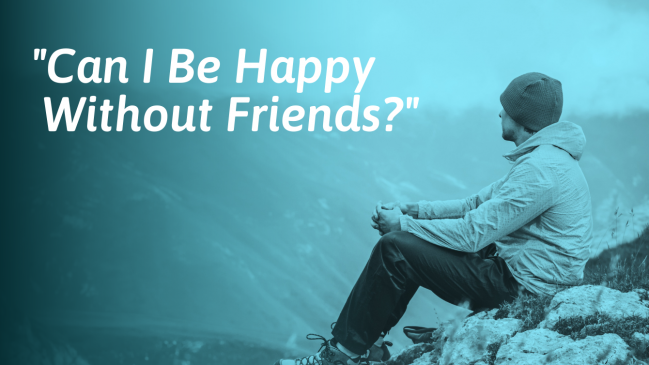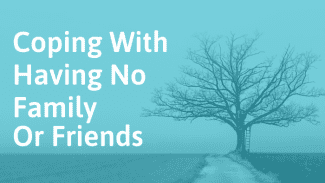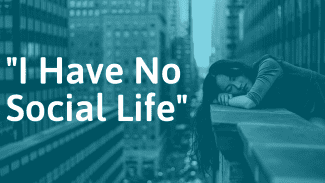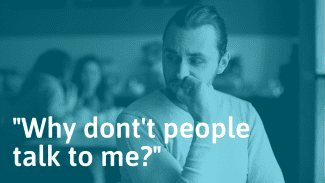“Can a person be happy without friends? Is having no friends dangerous? I have zero friends, and sometimes I wonder whether there’s something wrong with me.”
There can be a lot of social stigma about not having friends, and you may even have seen articles about how bad loneliness is for your health.
Lots of us can find ourselves with no friends, whether it’s just for a short time (for example, after moving to a new city) or in the longer term (for example, if a condition such as autism makes it difficult for you to form close friendships).
Having no friends doesn’t have to mean that you feel lonely.[1] There’s nothing inherently dangerous or unhealthy about being alone. It’s when isolation causes loneliness that your social health can suffer. It’s perfectly possible to have a full and exciting life when you’re primarily alone.
Here’s a list of tips that show you how to be happy without friends.
1. Consider your acquaintances
“Is it OK to have no friends if I have acquaintances? Do I need friends as long as I have people I can talk to?”
People often mean different things by the word “friend.” For some, a friend is someone you can hang out in a bar with every few months. For others, you only become friends when they spontaneously remember your birthday (without a FB alert), and you can share your deepest secrets.
Where you put the threshold for considering someone a friend is up to you, but try not to discount the “we hang out in a bar and talk nonsense” group entirely. Spending time with acquaintances can still be rewarding and fun.
Try to value the time spent with acquaintances for what it is, rather than focusing on trying to turn them into close friends. This lets you relax and enjoy yourself, which makes you more fun to be around as well. Read more here on how many friends you need.
2. Value your coworkers
Your coworkers might never become close friends, but they can be an important source of social interaction.
One of the things some people miss when working from home is daily contact with coworkers.[2] A casual “How was your weekend?” might seem like a very superficial interaction, but it can be important. You may know that you’re only ever going to say “Fine thanks. You?” but you always have the choice. Knowing that you could say, “Actually, it was pretty lonely” can somehow make us feel better.
One way to get more out of our social encounters with our colleagues is to accept that there is value in them. When we tell ourselves, “They don’t really care. They’re just asking to be polite,” we’re actively reducing how much we enjoy the conversation. Instead, try saying to yourself, “They value keeping our relationship polite, friendly, and fun.”
3. Find other points of view
Although people tend to be friends with people who are similar to themselves,[3] one of the important things that friends offer us is a different point of view. If we’re left alone with our thoughts for too long, we can become entrenched in our own worldview and struggle to see things from someone else’s perspective.[4] Luckily, there are other ways to find those alternate worldviews.
Social media and websites such as Reddit let you talk to a huge range of people with different interests and perspectives. Try to read and understand other people’s viewpoints, rather than trying to convince them of yours.
Volunteering is another great way to get to know people from a wide variety of backgrounds. Working in a soup kitchen or animal shelter can help you to have conversations with people who have lived very different lives from yours and offer you the chance to see things from a totally different perspective.
4. Plan for the tough moments
Even if life without close friends is generally OK, it might still get you down from time to time. There are some situations where having a social circle is expected, and not having friends can feel awkward. It can even leave you feeling at risk or vulnerable. Planning for these moments is a key skill to master when learning how to live without friends.
Being asked for an emergency contact
If you don’t have a partner or family nearby, being asked for an emergency contact can be an awkward moment. Consider what problems would occur if you were suddenly hospitalized, and try to find someone who would be able to help. For example, if you have pets, you might want to ask a neighbor or your dog walker.
You don’t have to say that you have no friends. You could say, “I have a favor to ask, and it’s completely OK if you say no. I need to put down an emergency contact on this medical form, and my biggest concern is that no one will look after the animals if I get sick. Would it be OK if I put you down? I don’t expect anything to happen but, if it does, I’d just like to know that they’re fed and watered.”
You do also have the option of leaving the box blank or writing “N/A” if there really is no one who would need to know if something happened to you, but this might lead to awkward questions. A solicitor is usually happy to fulfill this role, especially if they are the executor of your will.
New Year’s Eve and other celebrations
Some people who are absolutely fine without friends through the rest of the year can still find it difficult to hit midnight on December 31st and not receive any Happy New Year messages. The same can be true of Christmas and any other cultural or religious celebrations that are important to you.
Think about what’s important to you about a particular event and try to find other ways to acknowledge, achieve or celebrate that.
You might also like this article if you usually have birthday depression.
Becoming a parent
Becoming a parent is a pretty stressful time. Especially if this is your first child, you may feel well outside of your comfort zone. Lots of couples report feeling more isolated during pregnancy, and this can happen even if you’re usually fine without friends.
There is a huge amount of support available for new and expectant parents. Ask your health visitor, OBGYN, or midwife for suggestions in your local area. Support groups can be especially helpful, as you can discuss your concerns with people who are experiencing the same difficulties you are and can help to normalize your worries.
When going on an online date
Most women are familiar with the advice that you should always tell someone where you are going and when you are expected home when you’re going on a date, especially if you met the person online. This advice is almost exclusively aimed at women, but it’s actually a good idea to consider this kind of “safety call” if you have any concerns about any social event, no matter your gender or the type of event.
Luckily, you can now find apps such as SoSecure, which can offer similar protections.
When you have an unexpected crisis
Make a list of people and places you can turn to if you need to talk about a problem or crisis, such as redundancy or illness. This might be an online listening or therapy service, a leader in your religious community, an online forum, or an in-person support group. Consider seeing a therapist if you often feel the need to talk about deep-seated personal issues but have no one there to listen.
5. Lean on your family
This isn’t an option for everyone, as not all families are supportive and helpful, but spending time with your family can give you a sense of warmth and belonging.
We often see friends and family as two separate groups. In fact, your family members can also be close friends. They can support you, offer alternative viewpoints and celebrate important milestones with you.
6. Focus on your hobbies
One of the benefits of not having friends is that you can spend a lot of free time focusing on your hobbies. Sometimes, this may lead to you making friends, but that doesn’t have to be your focus.
Sometimes the choice of hobbies can be overwhelming. Try making a list of 3 things that you’d like to try, then give them a go. Try them for a month. If you like them, great. You’ve just found a new hobby. If not, that’s fine too. Make another list and try 3 more activities. We have some ideas to get you going.
7. Understand your needs
One of the ways in which people with few or no friends can be happier than those with lots of friends is when you take the time to really understand yourself and your needs. When we’re with other people, it’s easy to focus on their thoughts, feelings, and needs. Spending time alone can let you reflect on who you really are and what’s important to you.
Regular journaling can help you to understand yourself better, as well as giving you a chance to express your feelings.
Allowing yourself to process your feelings can also be really helpful. It’s OK to cry or to be angry or any other emotion that you’re feeling. Try not to push uncomfortable emotions away. Instead, try telling yourself, “This feels awful now, and that’s OK. I know things can, and will, change.”
8. Consider keeping a pet
If you are looking for some company and affection, and your lifestyle supports it, pets can be a great way to keep feeling connected. However, don’t underestimate the effect they have on your lifestyle and the amount of work that can be involved in taking care of them.
Taking on an older animal, possibly from a shelter, can make it easier to be sure that your lifestyle is a good fit for the pet you’ve chosen. Most shelters will ask questions and get to know a little bit about your living situation to make sure that you are paired with the perfect companion for you.
Some people who don’t have friends don’t have the lifestyle to keep a pet. You might spend a lot of time traveling or frequently move from city to city with work. If this is you, consider a pet-sharing service. These pair busy pet owners with people who would like to walk a dog on a regular basis but don’t have time to care for one full-time. This can give you some of the highlights of owning a pet without the usual costs and hard work.
9. Use social media carefully
Social media can have both positive and negative effects on mental health, especially for people who don’t have close friends. When it works well, it can provide a way of keeping in touch and provide low-effort social contact. Unfortunately, it can also encourage you to make comparisons between your life and the pictures of everyone else having a great time.
Remember that most people only show their best side on social media. If social media is getting you down, try limiting how often you check it, or even disengaging from certain platforms altogether.
A good way to decide whether social media is helping or hurting you is to set aside 15 minutes for social media use. Before you start, write down how you’re feeling, and then do the same thing afterward. If you do this 4 or 5 times over a few weeks, you should get a good idea of how social media generally makes you feel. If it helps, great. If it doesn’t, remember that you’re allowed to ditch it.
10. Be careful about leaning on your partner
Having no friends can seem easier when you’re in a relationship because you have a partner to turn to. This can sometimes place a strain on the relationship, as we sometimes expect the other person to shoulder all of our emotional burdens.
Remember that your partner isn’t your therapist, any more than they’re your personal chef, housekeeper, or chauffeur. If you know that you need help to work through personal issues, share them with the person you love but consider seeking professional assistance as well.
11. Make plans
When you spend a lot of time alone, it’s easy to fall into lazy habits. Without someone else to push us into new experiences, we might just come home from work and settle down with our favorite TV show or computer game without thinking about it.
It’s the not thinking about it part that can be a problem. If you really want to play that game or watch that show, that’s great. Go for it. It’s when we do it out of habit that we can become frustrated with ourselves and feel like we’ve wasted our time. Making plans proves that we’re thinking about how to spend our time.
We’re also much more likely to fall into a rut if we don’t have a plan in advance. Asking yourself, “What should I do this evening?” is more likely to have an exciting answer if you have the day to think about it than if you ask at 7 pm when you’re tired after work.
12. Enjoy being selfish
From an early age, we’re taught not to be selfish. Taking other people’s feelings and needs into account is really important, but sometimes we’re so focused on “not being selfish” that we forget about our needs.
When you don’t have friends, you can really focus on the things that make you happy. You don’t need to compromise. If you want pizza, you don’t need to check whether everyone else would prefer Chinese food. You can just have pizza.
Many of us worry about what we should want, even when we’re alone. Try asking yourself, “What would make me most happy right now?” and then doing that thing.
13. Look after your environment
Living a fulfilling life without friends means doing things for you rather than because other people expect you to. It can feel easy to keep a clean and tidy house when you know that friends might drop by for a coffee at short notice. When you don’t have friends, you might be tempted to think, “It’s just me, so it doesn’t matter.”
Part of living without close friends is that you have to matter to yourself. Try to make yourself carry out normal, everyday tasks such as tidying up and vacuuming regularly. Create an environment that you actively want to live in, not just one that you’re willing to put up with.
14. Look after your health
Your physical health can have a huge impact on your mental and emotional wellbeing. Having friends can make it easier to make healthy choices (though not always!). Without friends, you may need to pay a little more attention to ensuring that you look after yourself physically.
When you live alone, without friends and family nearby, you might struggle to find the motivation to cook a healthy dinner. Cooking and eating are often seen as social activities, particularly in some Mediterranean or South American cultures, so cooking alone can feel isolating. Cooking for one can also be labor-intensive, so consider batch-cooking and freezing individual portions.
Exercise can also be difficult when you don’t have friends. Having a gym buddy can give you accountability and ensure that you don’t miss training sessions or workouts. Consider finding a personal trainer or joining an online community to help keep you accountable.
15. Consider finding a side hustle
If you find yourself with lots of free time in the evenings and weekends, consider taking a part-time job or side hustle. This can provide extra income, give you more social interaction and help you to build new skills.
One very social side-hustle can be working as a ‘rented friend.’ There are several different sites offering these kinds of services, and it can be a lot of fun.
16. Remember that you can change
Hopefully, you now know how to have fun in life without friends. That doesn’t mean that you have to. We have loads of ideas to help if you want to make more friends or change acquaintances into friends. If you’re wondering what to do when you have no friends but want to make some, these articles are a good start.
Learning to live without friends can put you at an advantage when you come to build a social circle. Because you’re comfortable in your own company, you’re less likely to be drawn in by toxic friends.
Common questions about living life without friends
Is it healthy to have no friends?
People with no friends are not necessarily unhealthy, but research has shown that for most of us, high-quality relationships can promote good mental and physical health.[5, 6]
Can a person be happy without friends?
Yes, it’s possible to be happy in your own company. Some people prefer to be alone or to socialize only with acquaintances or with a partner. However, for most people, friendships are important for happiness and general wellbeing.
Is having no friends dangerous?
Having no friends isn’t dangerous if you enjoy your own company. But if you feel lonely, making friends and building a social network could improve your quality of life.






Teena, I can also lead as an example,I have no friends but I feel happy.
Wow!
This content is great and giving,i liked it!
All is great until you suffer an unexpected life-altering work injury while living alone off-grid deep in mountain terrain, and then your required 4×4 vehicle also unexpectedly breaks down. And the few people you do happen to know can’t even get to you. And you don’t have a family. Life is great, people still are not.
I am without friends or family at 50 due to a series of events beyond my control…my ex Husband had an affair with a close friend so I left him and our social circle. My new partner is kind and loving but his social circle was a mess of people taking drugs, drinking and cheating so we moved 250 miles for a new life 16 years ago. No one stayed in touch, soon after moving I became ill and disabled and unable to work or ride motorcycles anymore. I’ve tried making friends, joining choirs etc but I just get ignored by the existing little cliques. My disabilities seem to make me a talking point and then I become invisible when that’s done with. I am kind and friendly and approachable and neighbors and acquaintances often turned to me for advice and leaned heavily on me in a crisis but no one was ever there for me, I started to feel used and pulled away during last year or so…they only noticed when they wanted some advice or support off me. I literally have no one apart from my lovely Husband who works 60 hour weeks….I am very ill with a genetic disorder and will disappear from social media for weeks at a time but no one I know in the flesh even enquires if I’m OK, I do get messages from a friend in Bangladesh and one in the US that seem to genuinely care and are in similar circumstances. I now just throw myself into campaigning for animals and conservation…I have given up trying with people….had an absentee Dad who would mess me about, went 5 years without any contact from him as a teen, narcissistic cruel mother, so the family is the ultimate f word to me. Yes I’m lonely, I fear being left completely alone if I lose my Husband but I’m just so sick of being used or lied to, I can’t commit any more time to make new friends that will turn out to be yet more users and liars….
Mandy,
I can totally relate to what you are saying. It was like I was reading my life. God loves us both! Focus on Him..that is what I am going to do.
Very good article…
Yes you can always rely on your parents and family and have a pet…
I feel lonely. But I am afraid of to have friends. My old friends give me bewilderment. I can’t accept and feel it. So, I lived away from them. Now I can live peacefully but I feel lonely.
Today, I discussed with my mom. My mom said that ‘ you can’t live wihout friends, if you have the emergency, it’s ok having friends who help you’.
I am only child and no sibling. And, I don’t want to talk to my mom everything. I try to keep a pet but I am also afraid of affection with the pet. And, I don’t want to find love yet.
I have only one friend but sometimes I don’t want to talk with her how I feel and face with problem.
To be honest, now I feel extremely lonely.
Can someone give me suggestions?
Hope for the best from South East Asia (Myanmar)!
Hi,
I hope you’re OK, I know things are difficult in Myanmar right now!
There is a group called CodA and it is all about learning to build healthy relationships. There are online groups from Hong Kong that meet in SE Asia times.
If you have Whatsapp, you can use this link to join their groups and find out how to join the meetings.
https://chat.whatsapp.com/A5sv1mzXV3yGN0VjunKOLU